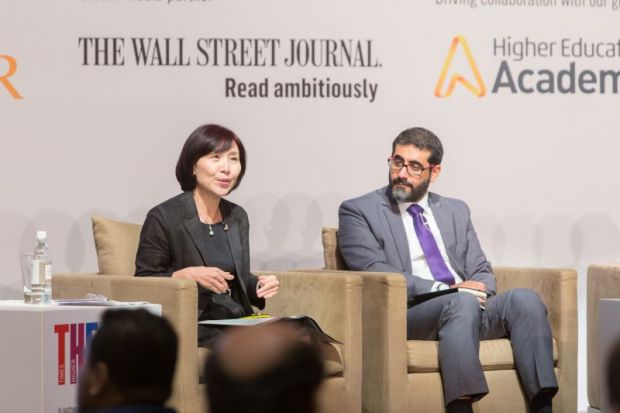Universities that specialise in the arts, humanities and social sciences believe that the data captured by governments and rankings to measure performance do not take into account the impact that these institutions have on society, the Times Higher Education Research Excellence Summit has heard.
Yu-Li Liu, dean of the office of research and development at Taiwan's National Chengchi University – which specialises in the humanities, social sciences and business – said: “We are undervalued by the system. This is our great challenge.”
Professor Liu argued that many of the measures used to assess universities' research quality could not be easily applied outside scientific fields. “Government knowledge performance indicators rely on patents and commercialisation of research,” she said.
Other metrics used by governments and ranking organisations include the number of journal articles that researchers publish, or how often they are cited by others and the amount of work institutions do with industry partners. These metrics, it was claimed, do not adequately capture all the work that universities do.
Professor Liu said that her institution has trained many of the Taiwan's politicians and media figures, and has “contributed a lot to society”. “We want to be treated equally by the world ranking system,” she told the summit, held at Taiwan's China Medical University.
Yuko Takahashi, president of Tsuda University, a women-only liberal arts college in Japan, told delegates that university rankings that relied only on data based on citation counts and industry income were “old-fashioned”.
“The world is facing so many problems, such as Isis and populism, and universities should be credited for developing society,” she said, adding that some Japanese students had been put off going to universities in the UK and US because of terrorist attacks and political situations.
“They do not feel safe there…rankings systems do not take account of the social situation in the countries they are measuring,” she said.
Professor Takahashi added there is a risk that the humanities and social sciences will get “left behind” if the assessment of universities continues to focus on measures such as industry income and citation counts, and the economic impact of university research.
Phil Baty, THE editorial director for global rankings, said that it was very difficult to measure the impressions that institutions make on society but that THE was investing in new ways to understand this.
Mr Baty said it was “absolutely clear” that some rankings serve the arts, humanities and the social sciences badly.
“But the THE rankings probably go further than any other to fully recognise subject diversity,” he continued, adding that citation and research grant data is normalised across 344 subjects. This means that data on the arts and humanities and social sciences are compared with the world averages in those subjects so they are not swamped by subjects that have high citation counts and large amounts of funding such as the sciences.
He said that THE recognises that there are “lots of highly desirable new areas for performance measurement”. THE is pioneering student surveys to help get a better understanding of graduates' role in society, Mr Baty added.
Register to continue
Why register?
- Registration is free and only takes a moment
- Once registered, you can read 3 articles a month
- Sign up for our newsletter
Subscribe
Or subscribe for unlimited access to:
- Unlimited access to news, views, insights & reviews
- Digital editions
- Digital access to THE’s university and college rankings analysis
Already registered or a current subscriber? Login








